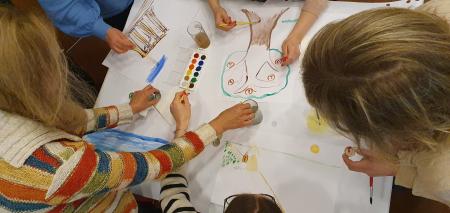The MGSC methodology uses movement, games, sports and creativity as psychosocial tools to develop the personal and social skills of vulnerable children, and therefore improve their resilience and psychosocial wellbeing. This methodology aims at improving the overall wellbeing of children through strengthening the psychosocial skills of the adults in charge, all the while passing on effective methods and tools (games and creative activities) for working with children. The methodology of training adults and playing games with children is based on Experiential Learning.
![]()
Background
In 2005, Terre des hommes foundation Lausanne initiated a project called “Movement, Games and Sport for children’s psychosocial development”, in the United Nations year dedicated to Sport and Physical Education. The main aim of this project was to use sport as a tool for education, development and for the promotion of peace. Since then, the MGSC methodology has been used in various countries and contexts in different parts of the world.
Context
Since the invasion in Ukraine in February when thousands of people fled Ukraine in search of safety in the neighbouring countries, there has been striking shortage of practitioners providing mental health and psychosocial support services to Ukrainian children and their parents/caregivers in their mother tongue. Therefore, the WELL-U project co-funded by the EU and SOS Italia aims to implement the MGSC methodology (alongside other methodologies such as PM+ and ReachNow) to support the psychosocial wellbeing of Ukrainian children.
Goals and target groups
The first aim of the approach is to improve the skill level of adults working with children, such as their personal, social, methodological, and technical skills. The children will, in turn, develop better mind, body and emotional aptitudes like confidence, trust, responsibility, respect, communication, cooperation, managing emotions and conflicts, etc.
Any children and youth aged 4 and above, including the most vulnerable, can gain benefits from participating.
Theoretical background
Games form an integral part of a child’s universe and are necessary for their physical and psychological development.
These games with psychosocial objectives were developed for children who have undergone traumas linked to natural disasters, domestic violence and (armed) conflicts to help them fulfil their psychosocial needs, however, they can be useful to any child in any context.
Psychosocial approach refers to the direct relationship between psychological and social, each influencing the other mutually and continually. The psychosocial wellbeing of children can be improved by stimulating their capacity to realise their full potential through the three fundamental needs: individual, social and existential.
Additionally, MGSC games aim to develop children’s abilities across three dimensions:
-
Mental, such as ability to concentrate, to observe, to anticipate, ability to think, to put a strategy in place, to make decisions, etc.
-
Physical, for example, flexibility, strength, endurance, resistance, speed, orientation, reaction, rhythm, balance, etc.
-
Emotional, namely self-esteem, enthusiasm, creativity, responsibility, honesty, determination, trust in others, respect, empathy, communication, commitment, cooperation, etc.
These skills can be developed through games based either on competition or on cooperation, which are rather complementary to the other. However, it is proven that children learn better in collaborative situations than alone.
MGSC is flexible as a methodology, does not function as a curriculum but rather can be used through isolated sessions.
MGSC sessions in general
All games use the body and senses. In order for the child to learn, these games need the presence of an adult to guide them.
In practice, the game is broken up into four key stages in a continuous cycle:
-
First experimentation of the game (practical);
-
Stop for discussion and corrections (analysis of what happened and synthesis of improvements to be made);
-
Second experimentation (application and improvement);
-
Stop for feedback (acknowledgement of improvements).
During the games, children might use tools such as brushes, paints, hoola hops, bands, balls etc., but there are games that don’t require any equipment at all.
Qualifications
MGSC sessions are conducted by trained MGSC facilitators/animators who are usually education specialists, teachers, social workers or animators. The training that MGSC facilitators were participating in is a high-intensity course held by accredited psychologists or psychotherapists. After the training, they are supported by on-the- job coaching and supervision during their work.
Source
Michèle Meuwly - Jean-Pierre Heiniger: Laugh, Run and Move to Develop Together (Games with a Psychosocial Aim) 2007.
![]()








